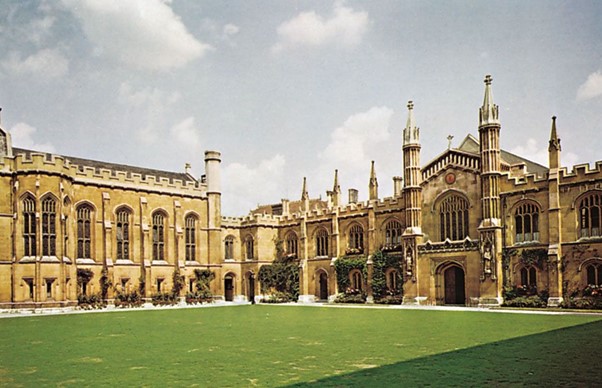With technology increasingly impacting every aspect of our lives, earning an Information Technology (IT) degree will open up a wealth of career opportunities. For prospective IT students, finding the right university is crucial. This guide will highlight the top 10 IT universities in UK, evaluating their strengths, innovative courses, and what they have to offer. Whether you’re interested in Software Development, Cyber Security, or Data Science, these institutions are well-placed to support your development in today’s technology-driven world.
Top 10 IT Universities in the UK
University of Cambridge

University of Cambridge stands out as one of the top IT universities in UK. Because its Computer Science program integrates various fields such as Mathematics, Engineering, Natural Sciences, Psychology, and Linguistics. Students also study important concepts in Economics, Law, and Business, providing a well-rounded education.
The university is located in the “Silicon Fen,” a lively tech and innovation hub with over 1,000 technology companies and research labs that actively recruit Cambridge’s top IT graduates. This vibrant environment offers many opportunities for students to build successful careers in the tech industry.
- International Fees: £41,124
- Entry Requirements:
- A-Level: AAA including Mathematics
- IB: 41-42
- Suggested Course: BA (Hons) Computer Science or MEng (Master of Engineering) Computer Science
University of Oxford

The University of Oxford is among the top 10 IT universities in UK, known for its blend of rich history and modern digital resources. Its Computer Science program uniquely combines theory and practice, equipping students with essential skills in software and hardware technologies. Oxford also excels in research areas like artificial intelligence and quantum computing, which are supported by a strong network that provides high-speed internet and top-notch IT support.
Oxford students have access to a wealth of research tools, including the Bodleian library’s extensive collections and the Oxford Research Archive, which offers millions of resources. With hands-on workshops and online learning opportunities, Oxford equips students with the skills they need for thriving careers in IT.
- International Fees: £144,260
- Entry Requirements:
- A-Level: AAA, including an A in Mathematics.
- Suggested Course: BA (Hons) Computer Science or MCompSci (Master of Computer Science)
Imperial College London

Imperial College London is considered one of the best UK universities, particularly for Computer Science and Information Technology. Its extensive curriculum includes a wide range of computing topics, allowing students to obtain a general education or specialise in their areas of interest.
ICL excels at teaching current computer and communication systems, preparing students to innovate and create the next generation of computing applications. Imperial also provides access to powerful High-Performance Computing (HPC) resources, including three supercomputers, which enhances the learning experience. These elements contribute to its global reputation, making it the best IT university in London.
- International Fees: £43,300
- Entry Requirements:
- A-Level: AAA, with an A in Maths, Further Maths, or Computer Science
- Suggested Course: BEng (Hons) Computer Science or MEng (Hons) Computer Science
University of St Andrews

The University of St. Andrews‘ Computer Science program provides a balanced curriculum for students studying IT in UK, covering Programming, Software Engineering, and specialized fields such as Artificial Intelligence and Human-Computer Interaction. With smaller class sizes, students receive personalized attention and support from faculty members, enhancing their learning experience. Furthermore, the university’s Center for Educational Enhancement and Development (CEED) offers outstanding resources and IT training courses, which help students improve and succeed academically.
- International Fees: £28,190
- Entry Requirements:
- A-Level: AAA including Mathematics
- IB: 38, including HL6 in Mathematics
- Suggested Course: BSc (Hons) Computer Science
University of Warwick

The University of Warwick is one of the best Computer Science universities in the UK, known for its academic excellence and innovative research. Located just three miles from Coventry, its Computer Science program combines new technologies with essential concepts, ensuring students are well-prepared for the tech industry.
Warwick ranks 3rd in the UK for research output, reflecting its commitment to high-quality education and innovation. The university also offers strong industry partnerships, giving students access to internships and real-world projects. Additionally, students benefit from access to the “Special Collections,” featuring over 16,000 rare publications, which enriches their learning experience with valuable historical resources. With state-of-the-art facilities and a supportive campus community, Warwick provides an enriching environment for students pursuing a career in IT.
- International Fees: £31,620
- Entry Requirements:
- A-Level: AAA, including Mathematics
- IB: 39
- TMUA (Test of Mathematics for University Admission)
- Suggested Course: BSc (Hons) Computer Science
University of Birmingham

The University of Birmingham offers a flexible three-year BSc in Computer Science programme that provides students with a thorough understanding of diverse computing platforms. The institution features cutting-edge facilities, including research labs for medical imaging, intelligent robots, and human-computer interaction (HCI), as well as specialised computing laboratories and robotics teaching spaces. Birmingham’s combination of innovative resources and a solid academic foundation makes it the top IT university in UK, ideal for anyone interested in a career in Information Technology.
- International Fees: £32,400
- Entry Requirements:
- A-Level: AAA, including Mathematics
- Suggested Course: BSc (Hons) Computer Science
UCL (University College London)

UCL is another good choice for students who study IT in UK. Its Computer Science BSc curriculum focuses on real-world problem-solving through problem-based learning, providing students with an industry-relevant education. In addition to core and optional courses, students in their second and third years can enroll in the Integrated Engineering Program (IEP), which expands their learning opportunities.
UCL also has several technology-focused societies, such as TechSoc and the Data Science Society. These societies host Tech Talks, hackathons, and challenges each term, creating an active community that enriches students’ academic and social experiences.
- International Fees: £43,500
- Entry Requirements:
- A-Level: AAA, including A in Mathematics
- IB: 40 points, including 7 in Higher Level Mathematics
- Suggested Course: BSc (Hons) Computer Science
University of Bath

The University of Bath stands out as one of the top 10 IT universities in the UK, thanks to its extensive industry connections, both domestically and globally. Moreover, its research-led department provides numerous opportunities for specialised projects, allowing students to propose their own topics or select from supervisor-suggested areas such as intelligent agents, autonomous aircraft control, 3D projection, smartphone addiction, and human motion capture.
- International Fees: £28,800
- Entry Requirements:
- A-Level: AAA, including A in Mathematics
- Suggested Course: BSc (Hons) Computer Science
Durham University

Durham University is a public research university that is well known for its attractive collegiate system, which combines ancient style with modern facilities. This supportive and dynamic environment is reflected in the strong performance of its Computer Science department, which was placed 4th in The Complete University Guide 2024.
The innovative curriculum covers cutting-edge technology such as AI and virtual reality, helping students remain up to date with industry developments. Durham University has top computer science graduates who have had successful careers as software engineers, analysts, and developers, with many working for major firms like BAE Systems, Google, and BT, as well as founding their own enterprises.
- International Fees: £35,500
- Entry Requirements:
- A-Level: AAA including Mathematics
- IB: 38
- BTEC: DDD
- Suggested Course: BSc (Hons) Computer Science or MEng (Hons) Computer Science
King's College London, University of London

King’s College London is an internationally renowned university in the CS undergraduate ranking, known for its excellent education and world-class research. Its strategic location in central London provides students with unique access to major global firms like Google and Amazon, as well as leading scientific societies such as the Chartered Institute for IT (BCS) and the Institution of Engineering and Technology (IET).
The Computer Science degree is BCS-accredited, ensuring it meets high industry standards. Furthermore, King’s is a prominent Russell Group university that attracts students from diverse backgrounds, particularly in its Computer Science departments, which have a significant number of female undergraduates.
- International Fees: £27,750
- Entry Requirements:
- A-Level: AAA including Mathematics or Further Mathematics.
- Suggested Course: BSc (Hons) Computer Science
Computer Science University Ranking
Except for the top 10 IT universities in UK, read on the Computer Science university ranking in the UK for more information about CS and IT degrees, enhancing your employability.
| Ranking | University Name | Score | Student Satisfaction | Graduate Prospect | Research Quality |
|---|---|---|---|---|---|
| 1 | University of Cambridge | 100% | n/a | 97% | 90% |
| 2 | University of Oxford | 98% | 80% | 98% | 95% |
| 3 | Imperial College London | 97% | 79% | 97% | 98% |
| 4 | University of St Andrews | 93% | 82% | 94% | 79% |
| 5 | University of Warwick | 93% | 75% | 93% | 94% |
| 6 | University of Birmingham | 93% | 81% | 96% | 94% |
| 7 | UCL (University College London) | 92% | 72% | 93% | 94% |
| 8 | University of Bath | 92% | 77% | 94% | 84% |
| 9 | Durham University | 92% | 71% | 96% | 86% |
| 10 | King’s College London, University of London | 92% | 74% | 97% | 89% |
| 11 | University of Manchester | 92% | 74% | 94% | 90% |
| 12 | University of Sheffield | 91% | 74% | 92% | 92% |
| 13 | University of Bristol | 91% | 77% | 93% | 90% |
| 14 | The University of Edinburgh | 91% | 71% | 93% | 93% |
| 15 | University of Southampton | 90% | 71% | 91% | 90% |
| 16 | University of Glasgow | 90% | 73% | 94% | 90% |
| 17 | Loughborough University | 89% | 80% | 92% | 81% |
| 18 | University of Dundee | 89% | 81% | 91% | 85% |
| 19 | University of Exeter | 89% | 77% | 94% | 75% |
| 20 | University of Leeds | 88% | 66% | 88% | 91% |
| 21 | University of York | 88% | 67% | 96% | 91% |
| 22 | Queen’s University Belfast | 88% | 74% | 94% | 83% |
| 23 | Lancaster University | 88% | 73% | 93% | 87% |
| 24 | University of Nottingham | 88% | 75% | 89% | 88% |
| 25 | Royal Holloway, University of London | 87% | 74% | 93% | 88% |
| 26 | University of Surrey | 87% | 76% | 100% | 82% |
| 27 | Queen Mary University of London | 87% | 76% | 83% | 91% |
| 28 | University of Strathclyde | 87% | 78% | 88% | 80% |
| 29 | Newcastle University | 86% | 71% | 90% | 86% |
| 30 | Aberystwyth University | 86% | 84% | 92% | 79% |
| 31 | University of Liverpool | 86% | 75% | 88% | 82% |
| 32 | Cardiff University | 86% | 69% | 93% | 85% |
| 33 | Swansea University | 85% | 76% | 88% | 81% |
| 34 | University of Sussex | 85% | 78% | 87% | 86% |
| 35 | University of Leicester | 85% | 77% | 90% | 78% |
| 36 | University of East Anglia UEA | 85% | 71% | 94% | 79% |
| 37 | City, University of London | 84% | 72% | 87% | 82% |
| 38 | University of Aberdeen | 84% | 77% | n/a% | 80% |
| 39 | Aston University, Birmingham | 84% | 75% | 87% | 71% |
| 40 | University of Kent | 83% | 73% | 85% | 85% |
| 41 | University of Essex | 83% | 75% | 90% | 83% |
| 42 | Heriot-Watt University | 83% | 66% | 90% | 79% |
| 43 | Ulster University | 82% | 77% | 87% | 78% |
| 44 | University of Reading | 82% | 73% | 84% | 77% |
| 45 | Manchester Metropolitan University | 81% | 77% | 84% | 69% |
| 46 | Brunel University London | 81% | 78% | 80% | 71% |
| 47 | University of Lincoln | 81% | 67% | 84% | 79% |
| 48 | Abertay University | 80% | 78% | 80% | 69% |
| 49 | Nottingham Trent University | 80% | 75% | 76% | 72% |
| 50 | Northumbria University, Newcastle | 80% | 76% | 81% | 70% |
Study IT in UK
At this point, you should already know the top 10 IT universities in UK. Choosing the right IT university is crucial to kickstart your tech career. Each of the best UK universities for Computer Science offers distinct strengths, from cutting-edge research facilities to strong industry connections. When evaluating your options, be sure to consider important factors like course accreditation, entry requirements, and the overall campus experience.
Ultimately, selecting the right academic environment will not only support your Computer Science education but also equip you with the critical skills needed for a fulfilling career in the tech industry. To complement your academic journey, visit uhomes.com, a dedicated platform that helps you find student housing near the best Computer Science universities in the UK, ensuring you have the perfect living situation while you focus on your studies.
FAQs about Top 10 IT Universities in UK
Admission requirements for IT degrees vary depending on the universities and programs, but they generally include:
- Studied mathematics, and/or computer science, or a science-based subject.
- Has passion, aptitude, or potential for IT studying.
- Knowledge and experiences of working in IT field.
To work in the IT field, the basic requirement is a bachelor’s degree in computer science, information technology, or computer engineering. You’ll also need to have majored in technology system analysis.
Computer Science best colleges in the UK include the University of Cambridge, the University of Oxford, Imperial College of London, the University of St Andrews, University of Surrey and the University of Warwick
IT experts with specialised skills and expertise in cybersecurity, data science, artificial intelligence, and cloud computing are frequently in great demand and earn higher pay. Salaries for top-tier roles, such as IT directors or Chief Technology Officers (CTOs), can rise from six to seven figures in some cases.
A bachelor’s degree in Information Technology usually takes three to four years. After that, a master’s degree requires an additional one to two years of study. For those pursuing a doctoral degree in IT, it usually takes three to five years or longer.







